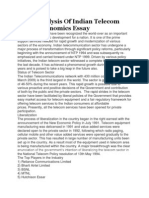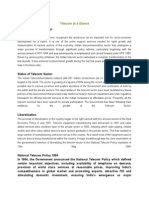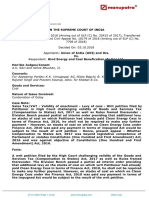0% found this document useful (0 votes)
40 views3 pagesNepal Telecom 5.4 Notes
The Nepal Telecommunications Authority (NTA) is an autonomous regulatory body established in 1997 to oversee and promote the telecommunications sector in Nepal. Its goals include ensuring affordable and quality services, managing service providers, and protecting consumer rights. NTA's responsibilities encompass licensing, tariff regulation, infrastructure monitoring, and promoting competition and modern technology use.
Uploaded by
jeewanb99Copyright
© © All Rights Reserved
We take content rights seriously. If you suspect this is your content, claim it here.
Available Formats
Download as PDF, TXT or read online on Scribd
0% found this document useful (0 votes)
40 views3 pagesNepal Telecom 5.4 Notes
The Nepal Telecommunications Authority (NTA) is an autonomous regulatory body established in 1997 to oversee and promote the telecommunications sector in Nepal. Its goals include ensuring affordable and quality services, managing service providers, and protecting consumer rights. NTA's responsibilities encompass licensing, tariff regulation, infrastructure monitoring, and promoting competition and modern technology use.
Uploaded by
jeewanb99Copyright
© © All Rights Reserved
We take content rights seriously. If you suspect this is your content, claim it here.
Available Formats
Download as PDF, TXT or read online on Scribd
/ 3

































































































